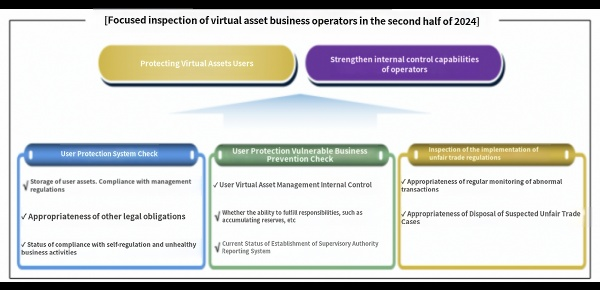
The Financial Supervisory Service (FSS) is conducting its first comprehensive inspection of cryptocurrency operators in the second half of this year. This marks the first full-scale audit since the enactment of the Cryptocurrency User Protection Act in July, focusing on the compliance of major domestic cryptocurrency exchanges and related businesses with regulatory requirements and internal control standards.

In its “2024 Second Half Cryptocurrency Operator Inspection Operation Plan,” the FSS announced that it would concentrate on ensuring compliance with the Cryptocurrency Act, user protection systems, and the establishment of surveillance systems against unfair trading. The FSS plans to inspect two major cryptocurrency exchanges and six wallet and custody service providers, including two won (KRW) market exchanges and three coin market exchanges, with on-site inspections scheduled for these entities.
The FSS aims to enhance preventive checks for businesses that are weak in user protection. This will include a thorough examination of compliance with regulations related to the custody and management of user assets (deposits and cryptocurrencies), the appropriateness of management contracts with banks and other custodians, and the state of insurance coverage and reserve funds to protect against hacking incidents. Additionally, the FSS will inspect the adequacy of systems designed to prevent unfair trading, such as the establishment of constant monitoring systems and criteria for identifying abnormal transactions.
In particular, the FSS emphasized the importance of user protection and prevention of unfair trading, stating that it would support businesses in strengthening self-regulation. Any violations discovered during the inspection process will be met with strict sanctions, and institutional improvements will be pursued if necessary.
An FSS official stated, “This inspection is a crucial measure to secure trust in the cryptocurrency market and strengthen user protection,” adding that they intend to guide businesses to reinforce their internal controls and self-regulation.




![[November]Uptober No More](https://coinhubkorea.com/wp-content/uploads/2025/10/Whisk_d78880efb01a730907f4be201effefe1dr-1-100x70.jpeg)

